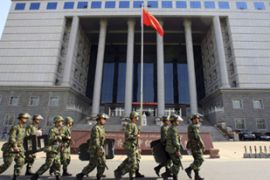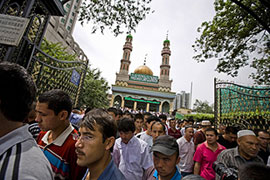China orders crackdown in Xinjiang
Campaign aims to wipe out lawlessness following July riots, state media says.

The announcement comes almost exactly four months after deadly riots in Urumqi, capital of Xinjiang, in what was China’s worst outbreak of ethnic unrest in decades.
The clashes between mainly Muslim Uighurs and members of China’s dominant Han ethnic group left nearly 200 people dead, according to the government.
Last month, 21 people were convicted for their roles in the unrest, with 12 sentenced to death. Those sentences were upheld in appeal hearings last week.
Tough action
On Tuesday the People’s Daily, the communist party mouthpiece, said the regional government wanted tough action to bring back stability to the region.
 |
| Beijing says Uighur separatists were behind the ethnic violence in the region [EPA] |
“From the start of November, public security bodies in Xinjiang will … start a thorough ‘strike hard and punish’ campaign to further consolidate the fruits of maintaining stability and eliminate security dangers,” it said.
Security forces will “root out places where criminals breed, and change the face of the public security situation in these areas”, the report added.
The crackdown comes amid an ongoing block on almost all internet, SMS and international phone services in Xinjiang that was first imposed during the riots.
In the worst ethnic violence in decades ethnic Uighurs attacked Han Chinese in the capital after taking to the streets to protest against earlier attacks on Uighur workers at a factory in southern China that left two Uighurs dead.
In September a series of alleged needle stabbings by Uighurs stoked fresh protests led by Han Chinese.
‘Terror watch’
The official Xinhua news agency said police will continue to look for suspects involved in the July riots, and “keep a close eye on clues and cases involving terrorism and explosions”.
The term “strike hard” was first used in the 1980s when Chinese police launched campaign-like sweeps intended to catch law-breakers.
The campaigns were dropped after pro-reform legal experts in China criticised them for ignoring suspects’ rights and setting targets for arrests that encouraged abuses.
Energy-rich Xinjiang, strategically located in central Asia, has been struck in recent years by bombings, attacks and riots, which Beijing blames on Uighur separatists.
The estimated 8 million Turkic-speaking Uighurs have long complained of religious, political and cultural oppression by Chinese authorities, and tensions have simmered in Xinjiang for years.
Many Uighurs also resent the massive influx of Han Chinese settlers who have in some areas reduced them to a minority in their own land.
Rights groups and Uighur activists have accused Beijing of grossly exaggerating the threat from separatists to justify harsh controls.